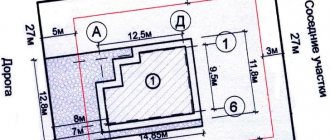The transition of modern Russia to the triumph of private property has given rise to many conflicts and problematic situations. This especially applies to real estate ownership. For decades, people lived in communal apartments, factory barracks, and handed over to their children the use of houses built by their grandfathers. It didn’t even occur to them that they needed to somehow document their right to such real estate.
This was done due to habit, mentality, or simply a frivolous attitude towards bureaucratic procedures. However, now the owners of such real estate are seeking to legalize their legal relations with this property. Current Russian legislation allows this to be done on the basis of the so-called acquisitive limitation period.
Article navigation:
What property can be registered by prescription?
Based on the prescription of ownership, it is possible to register ownership of ownerless property and property owned by another person.
It is POSSIBLE to register ownership due to the limitation of ownership on:
- real estate (apartment, house, building, cottage);
- movable property (car or other means of transportation);
- luxury goods (jewelry, works of art, antiques).
IMPORTANT! The following cannot be registered by acquisitive prescription:
- a plot of land that belongs to state or municipal authorities;
- unauthorized construction on an illegally occupied land plot;
- real estate that is not subject to privatization and remains in state ownership;
- an object built on a land plot not provided for these purposes;
- objects restricted in circulation or withdrawn from circulation (for example, weapons).
Conditions for registering property according to the acquisition limitation period
The provisions and rules on property by prescription of possession are legislated in the Civil Code of the Russian Federation, Article 234 “Acquisitive prescription”.
To register ownership rights by virtue of acquisitive prescription by a citizen or legal entity. During the entire period of ownership, the person must comply with the following conditions:
- Maintain the property in good condition, perform the maintenance and upkeep of the property, and perform responsibilities for paying utility bills, insurance services, or other duties related to the use of the property.
- the fact of ownership should not be hidden from others and from the owner of the property, that is, actual ownership must be open.
- ownership of the property must not arise from illegal acts and must be in good faith. For example, unauthorized entry into a house will not give you the opportunity to subsequently acquire ownership rights to it due to the statute of limitations. However, it is conceivable that the owner may not have known that he acted illegally when acquiring the property.
- There should not be a lease agreement, free use agreement or other agreements that give the right to use the property with the real owner of the property.
- ownership of the property must be continuous (15 years for real estate, 5 years for movable property);
- The previous owner must have an official title to the property, at least in the BTI (otherwise the deceased users will first have to have their ownership rights recognized in court, 15 years are counted from this date).
If these conditions are not met when filing a claim in court, you will be denied registration of ownership rights due to the statute of limitations.
Voidable transaction
Voidable transactions can only be declared invalid in court proceedings. Here are examples of voidable transactions:
- One of the parties entered into the transaction as a result of fraud, coercion, or threat from the other party.
- The victim entered into a transaction as a result of being materially misled. For example, when instead of a two-story country house, the buyer received a dilapidated two-story barn.
- The transaction was concluded by a person with limited legal capacity. This includes people who are addicted to alcohol or drugs.
- The transaction was concluded with a child between 14 and 18 years of age without the consent of parents, guardians or trustees.
- The deal was concluded for an apartment, not all of whose owners gave their consent.
After the transaction is declared invalid, both parties must return to the original owners everything they received under the transaction. The buyer returns the property, and the seller returns the money. If something happens to the property and there is no way to return it, it is necessary to reimburse the cost.
Acquisition limitation period for property
In accordance with Article 234 of the Civil Code of the Russian Federation, the period of acquisition limitation begins from the day the property enters the open possession of a bona fide acquirer.
IMPORTANT! It is possible to register ownership of real estate due to acquisitive prescription after 15 years of continuous ownership, movable property after 5 years. If the property has an owner, 3 years are added to this time for the limitation period to expire.
This means that you need to wait to see if the owner shows up to reclaim your property from someone else's possession. Thus, you can file a lawsuit to recognize ownership of real estate only after 18 years, and for movable property - after 8 years.
If you are the legal successor of the owner of the property to which you want to register ownership due to the statute of limitations, then you can combine your terms of ownership of this property. For example, if an unregistered apartment is inherited, the heirs can add the testator’s tenure to their tenure.
In which court should a claim for ownership be filed based on prescription?
Ownership rights can be registered by prescription only by a court decision.
IMPORTANT! To recognize the right of ownership by acquisitive prescription, it is necessary to file a claim or application with the district court at the location of the property.
If you know the previous owner of the property, then a claim is filed in court to recognize the right of ownership of real estate on the basis of acquisitive prescription . In this case, he is brought in as a defendant.
In the case where the previous owner of the property is not known and should not have been known, it is necessary to file an application with the court to establish the fact of bona fide, open and continuous possession of the property as one’s own during the period of acquisitive prescription. The body for registration of rights to real estate and transactions with it is invited to participate in the case as an interested party.
The price of a claim for real estate is determined by its inventory value according to BTI documents. The state duty for such claims is calculated and paid based on the price of the claim. To consider the case in court, you must provide the appropriate package of documents.
Statute of limitations for real estate transactions in 2020
A real estate transaction may violate the rights of the person concerned - both a party to the contract and a third party. Finding himself in such a situation, the victim turns to the court to protect his rights.
At the same time, it is important not only to write the application correctly and pay the fee, but also not to miss the deadlines, otherwise protection will be denied. Today we will take a closer look at how to correctly determine and calculate the statute of limitations for real estate transactions.
General rules
The limitation period for real estate transactions is governed by the following rules:
- Chapter 12 of the Civil Code of the Russian Federation - general provisions on the limitation period;
- Art. 181 of the Civil Code – calculation features specifically for real estate transactions.
The general limitation period is 3 years. Sometimes it is reduced to 1 year, and sometimes it reaches 10 years. The calculation of the period occurs after a legal assessment of the situation. It is important to formulate a requirement and see which particular article or series of articles it fits under. This process is called legal qualification.
IMPORTANT! It is impossible to change the limitation period by agreement of the parties, for example, by a real estate purchase and sale agreement. Even if such a condition is written down, it should not be applied.
3 years or 10 years
In the fall of 2013, the Civil Code underwent changes, according to which the limitation period was actually increased to 10 years. This rule only applies if a number of conditions are met.
The general limitation period itself is 3 years. But in order to restore his right, a citizen needs to know not only about the fact of the violation, but also who exactly is the violator - the defendant in the case. The total period of three years begins to run when both of these circumstances become known to the plaintiff. At the same time, it cannot flow longer than 10 years.
CONCLUSION. The complexity of the legal formulations gave rise to the opinion that the limitation period was extended to 10 years. This is not entirely true. If you know about the violation of your right and who should answer for it, the period is already running and is 1 or 3 years, depending on the type of real estate contract.
Determining what time period needs to be applied
Two points will help you correctly calculate the limitation period for real estate:
- On what legal basis is the contract supposed to be challenged? Any ground relates to either void or voidable contracts. For void claims the term is 3 years, for voidable claims – 1 year.
- Determine the moment when the period begins. For the parties to the contract it is one, for third parties it is different. The basis for the challenge is also important.
Table of grounds for real estate
The statute of limitations directly depends on the basis of the claim. The basis is the answer to the question why the contract should be canceled. Any real situation falls under one of the legal grounds under the Civil Code. Below is a table of such grounds and links to the law. All bases are distributed into two large blocks with a period of 1 or 3 years.
| Period | Base | Article of the Civil Code |
| 1 year Voidable transactions | The prior consent of the interested party has not been obtained:
The plaintiff here will be the person whose consent was not obtained (spouse, guardianship authority, guardian, etc.) | 173.1 |
| The party to the transaction did not understand the significance of his actions, although he was fully capable | 177 | |
| Misconception - the party to the transaction was not aware of some significant circumstance when signing the contract. Knowing about him, she would not have signed the papers | 178 | |
| Deception, violence, threat - the party to the transaction was forced to sign the agreement. The deliberate silence of the other party about important circumstances is also recognized as deception here. | 179 | |
| The bonded side was forced to sign the agreement, although its terms were extremely unfavorable for it. Difficult circumstances matter here | Part 4 art. 179 | |
| 3 years Void transactions | Antisocial – imprisoned for an illegal purpose. For example, if the agreement was concluded with the aim of depriving a minor of property. | 169 |
| An imaginary or feigned transaction - the parties entered into a “false” agreement in order to cover up their real motives or to only create the appearance of a transaction. For example, fictitious re-registration of property to a third party so as not to be arrested by bailiffs. | 170 | |
| The party to the transaction was mentally incompetent and there is evidence of this (decision to recognize him as incompetent) | 171 | |
| The transaction was signed by a child under 14 years of age | 172 | |
| The notarial form of the transaction has not been observed, if it is mandatory. And also in cases where the legal requirements for completing a transaction are violated | 168 |
A special case that is not included in the list is if the pre-emptive right of a co-owner of the property is not respected when selling a share. In this case, the co-owner of the property can transfer the rights of the buyer to himself within 3 months. However, the transaction itself in this case remains in force and is not canceled, as in the case of a challenge.
IMPORTANT! The difference between void and voidable real estate transactions is purely legal. Voidable ones are canceled by a court decision, but void ones initially have no legal force and it is not necessary to go to court to cancel them. In practice, they go to court to invalidate any type of transaction, since the law allows the requirement to be formulated in this way.
At what point does the deadline begin to run?
Art. is entirely devoted to this issue. 181 Civil Code of the Russian Federation. Below is a table with detailed rules:
ATTENTION! The term begins the day after it begins. For example, if the execution of a purchase and sale agreement began on February 11, then the period will begin to run on February 12. The last day of the term will be February 11 of the last year of the term.
What to do if the deadline is missed
The court refuses on the grounds that the statute of limitations has expired if such an argument is made by the defendant. If the application is not received, the case will be considered on its merits. If so, you can ask the court to reinstate the term.
ATTENTION! The limitation period is the basis for a decision to refuse, even if the demands put forward are legal, justified, and fully supported by evidence. It is almost impossible to challenge such a refusal.
The claim period is restored if the following conditions are simultaneously met:
- the pass was allowed due to extenuating circumstances (a difficult set of circumstances that can be documented);
- These reasons arose in the last six months of the limitation period.
The defendant will file an application for the application of the statute of limitations - the response must be to file an application for its restoration. The judge will grant the request if he finds the reasons sufficiently compelling. Download a sample application for reinstatement of the claim period for free using this link.
Dealing with the prescription is difficult only at first glance. In fact, it is enough to determine two points - to determine the basis on which the transaction will be contested, and the day the period begins. Our practical instructions will tell you the rest.
Documents for filing a claim
- claim or application to court;
- copy and original passport;
- a document confirming an attempt to resolve the dispute out of court (extract from the post office);
- technical documents for the disputed property (cadastral passport, extract from the Unified State Register, BTI, etc.)
- receipt for payment of state duty;
- notification of sending (delivering) a copy of the claim and documents to the defendant (if known);
- evidence of continuous ownership of the object of dispute for 15 years (receipts for utilities, agreement with the management company, tax receipts, witness statements).
How to protect yourself from scammers and lawsuits
Before concluding any real estate transaction, especially on the secondary market, carefully study all documents and owners. Errors, forgeries, lack of consent of one of the owners - all this can lead to the transaction being declared invalid.
The main step when checking real estate is obtaining an extract from the Unified State Register of Real Estate. In it you can see all the main characteristics of the property, information about the owners, sales history, the presence of encumbrances and many other factors that may be a warning sign. If you see that the seller has owned the property for more than three years, then there is much less risk.
Order an extract from the USRN right now!
Express instructions “How to register property according to the acquisitive limitation period”
- Check compliance with the acquisition limitation period and the limitation period (15 years for real estate, 5 years for movable property + 3 years).
- File a claim or application to the court.
- Collect a package of documents for filing a claim and proof of ownership of the object of the dispute.
- File a claim or statement in court.
- Get a court decision.
- Based on the court decision, submit documents for registration of property rights to the Unified State Register.
Property ownership should not be taken lightly. If you do not register ownership in a timely manner, you may be left with nothing or spend a lot of effort and money on litigation. If you have any problems or questions related to the recognition of ownership of real estate, ask them in the comments, or leave a request to our online consultants.
Want to share?










